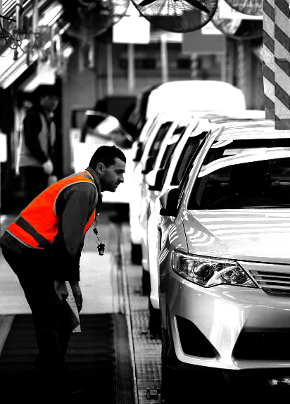Health among concerns as SA factories slow
 Domestic violence, crime, suicide have all been highlighted as potential consequences of the decline of Australian manufacturing.
Domestic violence, crime, suicide have all been highlighted as potential consequences of the decline of Australian manufacturing.
An inquiry looking at the consequences of Holden’s planned South Australian plant closure has heard that the impacts could be dire.
Reverend Peter Sandeman, a member of the State Government's Automotive Transformation Taskforce, said time was running out to retrain workers.
“If young people don't see a chance of getting employment at the end of school, why stay in school?” he asked the hearing, part of a larger inquiry into income inequality.
“If young people don't see by being active and positive citizens in Australia, they are not going to get a fair go, well why be active, why be positive?”
Reverend Sandeman said the funding meant to help workers move to other jobs would not be enough.
“We’re talking about the funds that the Federal Government and the State Government and Holden’s and Toyota are jointly contributing to help the transformation of businesses and workers into the new post Holden arrangement,” Mr Sandeman said.
“There is about $160 million dollars available for that. It's not enough, we need more.”
The inquiry was the result of a motion put forward by the Greens, who say it was needed to gauge the unprecedented fallout of several closures in a short period.
“It will be the closure of an entire industry and there will be significant long-term impacts, both social and economic, if we don't get the transition right,” Greens Senator Penny Wright said.
“It's really important that Australians understand just how difficult it is for some people to keep their heads above water, how desperate the situation can be for them and how government policies can actually make that situation worse.
“If we don't make the transition we've heard there will be increases in crime, there will be increases in domestic violence, there will be increases in mental health issues and even suicides because the flow-on effects will be so significant.
“That will have huge implications, not only for people living in the northern suburbs, but living elsewhere in South Australia.
“We know there will be flow-on effects, not just for workers who are out of work in the automotive industry but all the small businesses and the other aspects of community that rely on a thriving economy.
“Less employment means higher costs for government.”
Ross Womersley from the South Australian Council of Social Service said workers were becoming anxious about their future.
"Already I think we are seeing people who are losing their confidence because they anticipate the closure of Holden and that in turn drives business out of the place rather than into an area like this," he said.
Meredith Perry from Uniting Care Wesley told the inquiry that the closure of Holden could lead to the “perfect storm of disadvantage”.
“Our anxiety is that we will see more of those factors emerging over the coming years,” Ms Perry said.
“We are seeing increasing numbers of people presenting for emergency relief for food support, for financial support. That will only grow.”







 Print
Print